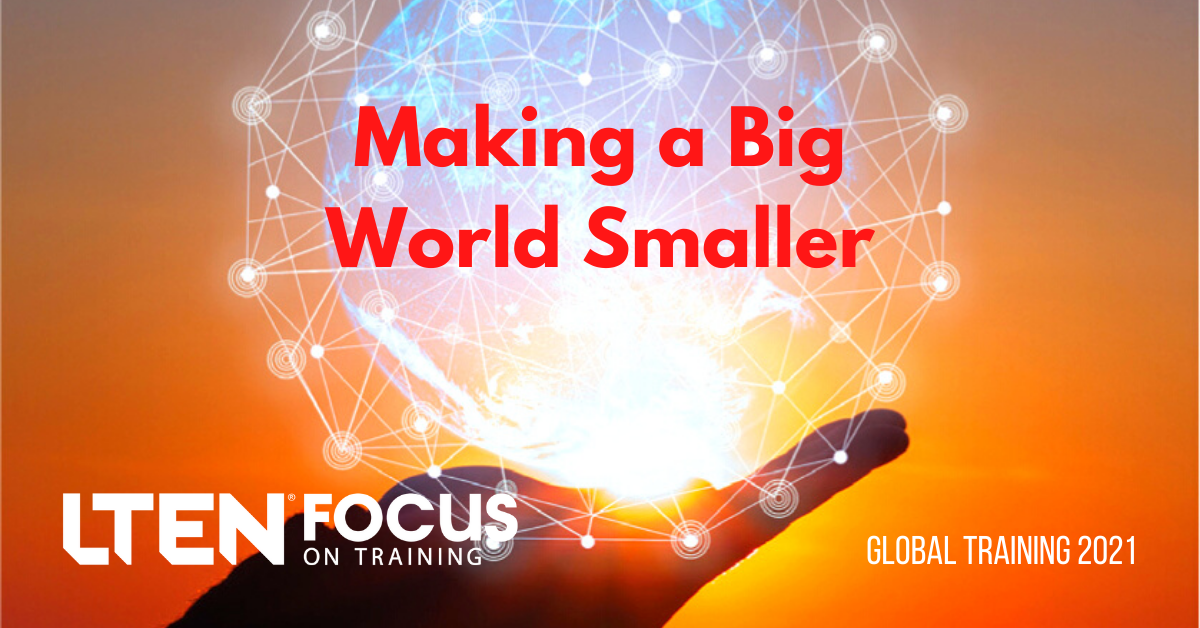
Making a Big World Smaller
From the President – Richard Sampson
Right now, the world is practically tiny. And training gets much of the credit.
 I’m pretty sure I’m not the only one who feels like the world has gotten smaller.
I’m pretty sure I’m not the only one who feels like the world has gotten smaller.
Think about it: When I was younger, Europe seemed like a far-off place that you heard about but couldn’t really imagine. Australia was an even farther away dream. Asia, Africa and South America seemed like exotic locales you’d read about in National Geographic, not hotbeds of business innovation and culture.
Naturally, much of that was just youthful naivete, a here-centered mentality that people of my generation tended to grow out of thanks to the eye-opening realities of college. Once you make your first friend who has lived outside of the United States, the world gets smaller.
But now? It’s practically tiny.
We’re just now coming out of the worst – but most effective – example of globalism you could find. If the pandemic taught us anything, it’s that our world is a much smaller, much less insulated place than some people might have wanted to believe. I don’t know if the famous “chaos theory” example of a butterfly flapping its wings in Japan causing a hurricane in Florida is really true, but I know our actions affect people we’ll never meet, and despite borders, sports teams or anything else that might divide people, we’re all connected and interdependent on one another.
I know one more thing too. Training gets a good deal of the credit there. Through training, different cultures discover similar goals, diverse people find common threads, and unique ideas blend to build wonderful things.
Many, maybe most, life sciences companies have international offices and teams, building customer bases literally around the globe. Some of us still work in U.S.- centric or North American-centric companies, but the global marketplace is making that specialization a rarer beast these days.
We’re seeing the growth of global – or maybe the shrinking of the distance – here at LTEN too. Allow me to share some metrics that tell a bigger story:
LTEN Focus on Training magazine also had its most international year in 2020, with readers from 109 different countries visiting a Focus issue. By comparison, 2019 issues saw readers from 77 countries. Among the biggest changes – India saw a 105% increase in readers, becoming our second-largest readership block (Canada … challenge accepted?), and we saw a 615% increase in Egypt, a 922% increase in Saudi Arabia and a 260% increase in Australia.
Technology, of course, brings us together, but so does common need and interest. Think globally, act locally is more than a motto these days – it’s how business works.
But I don’t need to convince you of that. I’m sure you have the perspectives, responsibilities and frequent flier miles (maybe not recently added) to prove my point.
So with all that in mind, I hope this rather large issue of LTEN Focus on Training magazine is helpful. We have more than a dozen articles waiting for you in the pages ahead, and we’ll tackle global topics like onboarding, coaching, customization, localization, analytics, strategy and alliances.
I’m pretty confident you’ll find useful information here, if only because the information is coming from you. Every article you’re about to read is written by an LTEN member, and the authors represent all corners of the globe (if a globe had corners). It’s our largest global issue written by our most global collection of authors. If I sound proud of that, it’s because we are, and we, collectively, should be.
I’m going to end with one more global-related message. What makes global partnerships and programs possible is sharing, working together. In that spirit, please do share these articles with your global colleagues and urge them to share what they know with other LTEN members. Our door is always open to articles from members and member companies, and by sharing our knowledge and our hard-learned lessons with one another, we all move ahead, and our world becomes delightfully smaller and more connected.
When we were young, we might have dreamed that “anywhere in the world is possible.” Today we are relying on it. The future visionaries, in all of us, are excited to see what comes next.
Richard Sampson is president of the LTEN Board of Directors and head of global
training for Cepheid. Email Richard at richard.sampson@cepheid.com.








